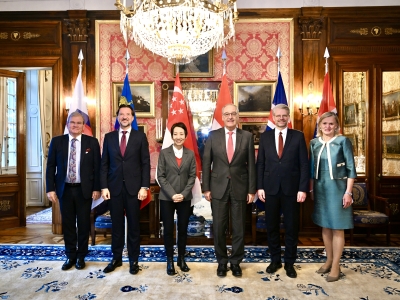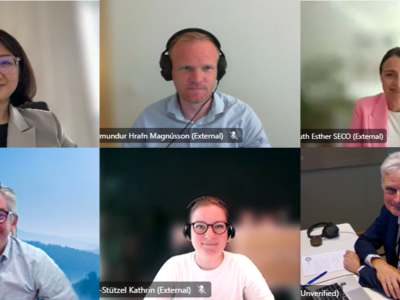About
The EFTA States signed a Free Trade Agreement with Singapore in Egilsstaðir, Iceland, on 26 June 2002. The Agreement entered into force on 1 January 2003.
In recognition of the growing importance of digital trade and to deepen bilateral relations and cooperation, the EFTA States and Singapore signed a Digital Economy Agreement (DEA) on 25 September 2025. See the joint communiqué on the signing here and the summary and text of the DEA below.
Key facts
- Population
6,036,860
- GDP
$ 547,386.65 M
- Date of Signature of the Agreement
26.06.2002
(FTA)
25.09.2025
(Digital Economy Agreement)
- Date of Entry Into Force
01.01.2003
(FTA)
N/A
(Digital Economy Agreement)
- Imports to EFTA States
EUR 3 295 million
- Exports from EFTA States
EUR 4 158 million
Information about agreement
Content of the Digital Economy Agreement
The EFTA–Singapore Digital Economy Agreement (DEA) reflects the growing importance of trade in goods and services enabled by electronic means. With the DEA, EFTA aims to ensure improved predictability for such trade, building on and complementing other international processes and initiatives. This includes the recent agreement found in the context of the WTO Joint Statement Initiative on E-Commerce, in which all EFTA States and Singapore participate.
The DEA covers core digital trade provisions aimed at facilitating digital trade. Among others, these pertain to the recognition of electronic signatures and contracts, a permanent ban on customs duties on electronic transmissions (in line with current practice of the EFTA States and Singapore), paperless trade administration, the fostering of online consumer trust, and a commitment to support the development of efficient and secure cross-border electronic payments and invoicing.
The DEA also addresses more fundamental preconditions related to digital trade. The corresponding articles cover recognition of the benefits of open internet access and the general prohibition on requiring the disclosure of source code and cryptographic elements as a precondition for digital trade. It further ensures free cross-border data flows based on disciplines prohibiting localisation requirements for computing facilities and data.
These obligations are flanked by a strong commitment to protect personal data and privacy, requiring each Party to adopt or maintain the appropriate safeguards to ensure a high level of protection. Online consumer protection and measures against unsolicited commercial electronic messages are addressed as well.
Alongside this, the DEA includes articles on forward-looking and emerging issues such as artificial intelligence, digital identities, financial technology, cybersecurity and innovation in the digital economy, including with respect to distributed ledger technologies.
Based on the DEA, EFTA seeks to play a leading role in setting high-standard digital trade rules.
Content of the Free Trade Agreement
The Agreement has a comprehensive scope, including trade in goods (industrial products, processed agricultural products, fish and marine products), trade in services, investment, protection of intellectual property rights, public procurement and competition. Bilateral agreements on basic agricultural products between the individual EFTA countries and Singapore also form part of the instruments creating the free trade area.
The Agreement consists of 73 Articles, twelve Annexes and a Record of Understanding. The Agreement covers the following main subjects:
- Trade in Goods
- Rules of Origin
- Sanitary and Phytosanitary Measures (SPS)
- Technical Barriers to Trade (TBT)
- Trade Remedies
- Trade in Services
- Investment
- Protection of Intellectual Property (IPR)
- Government Procurement
- Competition
- Institutional Provisions
- Dispute Settlement
Trade in Goods
Industrial Goods and Fish and marine products
All trade in industrial products and fish and other marine products from the EFTA States will benefit from duty-free access to the respective markets as of entry into force of the Agreement.
Agricultural products
Trade in processed agricultural products are covered in an Annex under the main Agreement. The Annex grants concessions for products such as sugar confectionary, chocolates, pasta, prepared foods, sauces and preparations, soups, waters etc.
In addition, trade in basic agricultural products is covered in three bilateral agreements on basic agricultural products negotiated between the respective EFTA State (Iceland, Norway and Switzerland/Liechtenstein) and Singapore.
These agreements form part of the instruments establishing the free trade area and are subject to the relevant disciplines for trade in goods in the main agreement. They provide for concessions on both sides. Each agreement contains specific rules of origin, generally based on the “wholly-obtained” criteria.
Rules of Origin
The Agreement provides for liberal rules of origin. Furthermore, for a restricted number of products, it allows in outward processing an increased 50 per cent limit applicable to the total added value in and outside the territories of the Parties.
Sanitary and Phytosanitary Measures (SPS)
The Parties agree to apply their regulations in sanitary and phytosanitary matters in a non-discriminatory manner and to not introduce any new measures that have the effect of unduly obstructing trade.
Technical Barriers to Trade (TBT)
The Agreement contains a provision on technical regulations which is in accordance with the relevant WTO Agreement and which provides for strengthened cooperation in the field of technical regulations, standards and conformity assessment.
Trade Remedies
The Agreement contains provisions on subsidies, anti-dumping and emergency action on imports of particular products. Regarding anti-dumping, the Agreement provides that a Party shall not apply anti-dumping measures in relation to products originating in another Party.
Trade in Services
The Chapter on trade in services covers the liberalisation of all four modes of service supply, as defined under the WTO GATS in all services sectors with the exception of air transport. The liberalisation of trade in services takes place according to schedules of specific commitments. The schedules of commitments will be reviewed at least every two years, and the Parties have committed themselves to liberalise substantially all trade in services within a timeframe of 10 years.
The two Annexes on financial services and telecommunication services contain additional disciplines which are of specific relevance to these sectors.
Investment
As regards investment, the Agreement covers both access for foreign investors to the respective markets and the protection of existing and future investments.
The disciplines concerning investment protection correspond to those usually found in bilateral investment protection agreements, including provisions on promotion and protection, national and MFN treatment, taxation, dispossession and compensation, domestic regulation, transfers and key personnel. The Agreement also foresees the possibility of direct dispute settlement between a Party to the Agreement and an investor of another Party. Such disputes may be submitted to binding arbitration provided both parties to the dispute agree upon this. Reservations to the Chapter are contained in Annex XI.
Protection of Intellectual Property (IPR)
The provisions on protection of intellectual property rights cover, inter alia, patents, trademarks and copyright and geographical indications.
The level of protection in certain areas goes beyond what is stipulated under the WTO Agreement on Trade Related aspects of Intellectual Property, taking into account the principles of most favoured nation treatment and of national treatment.
Government Procurement
The Chapter on government procurement confirms the respective commitments under the WTO Agreement on Government Procurement. The Agreement also provides for co-operation between the Parties and for the establishment of contact points to exchange information on rules in this field.
Competition
Regarding competition, the Agreement includes provisions on co-operation and exchange of information with the aim of ensuring and facilitating the enforcement of the Parties' respective competition laws.
Institutional Provisions
A Joint Committee comprising the EFTA States and Singapore supervises the implementation of the Agreement.
Dispute Settlement
A separate Chapter on dispute settlement aims at ensuring effective dispute settlement and implementation of the provisions of the Agreement.
Free Trade Agreement
Digital Economy Agreement (not yet in force)
Annexes and Record of Understanding
| Trade in Goods | Annex I | Concerning the Definition of the Concept of "Originating Products" and Methods of Administrative Co-operation | Appendix 1 | Introductory Notes |
| Appendix 2 | List Rules | |||
| Appendix 3 | Outward Processing | |||
| Annex II | Territorial Application | |||
| Annex III | Processed Agricultural Products | Table | ||
| Annex IV | Fish and Other Marine Products | |||
| Annex V | Products not covered by Article 8 | |||
| Trade in Services | Annex VI | Most-Favoured-Nation Treatment | ||
| Annex VII | Schedules of Specific Commitments | Appendix 1 | Singapore | |
| Appendix 2 | Liechtenstein | |||
| Appendix 3 | Iceland | |||
| Appendix 4 | Norway | |||
| Appendix 5 | Switzerland | |||
| Annex VIII | Financial Services | |||
| Annex IX | Telecommunication Services | |||
| Annex X | Recognition of qualifications for Engineering Services | |||
| Investment | Annex XI | Investment Reservations | Appendix 1 | All Parties |
| Appendix 2 | EFTA States | |||
| Appendix 3 | Singapore | |||
| Appendix 4 | Iceland | |||
| Appendix 5 | Liechtenstein | |||
| Appendix 6 | Norway | |||
| Appendix 7 | Switzerland | |||
| IPR | Annex XII | Protection of Intellectual Property | ||
| Other | Record of Understanding |
PAPs notifications
Bilateral Agreements on Agriculture
| Iceland-Singapore |
| Norway-Singapore |
| Switzerland-Singapore - English / French / German / Italian |
Joint Committee Decisions
| Decision | Subject | Adopted | Entry into force |
|---|---|---|---|
| 2025 | |||
| No. 1/2025 | Amendments to Annex VIII and addition of Chapter IIIbis (Digital Economy Agreement) | 22.09.2025 | |
| 2011 | |||
| No. 1/2011 | Amendments to Article 21 of Main Agreement | 23.11.2011 | 01.09.2021 |
| 2010 | |||
| No. 1/2010 | Amendments to Annex IV | 06.07.2010 | 01.11.2011 |
| 2007 | |||
| No. 5/2007 | Amendment to App. 1-3 of Annex I | 14.03.2007 | 01.08.2007 |
| No. 4/2007 | Amendment to Annex I | 14.03.2007 | 01.08.2007 |
| No. 3/2007 | Amendment to Annex IV | 14.03.2007 | 01.08.2007 |
| No. 2/2007 | Amendments to Annex V | 14.03.2007 | 01.08.2007 |
| No. 1/2007 | Amendments to Annex III | 14.03.2007 | 01.08.2007 |
| 2004 | |||
| No. 2/2004 | Model Rules of Procedure for the Arbitration Panel | 26.05.2004 | 26.05.2004 |
| No. 1/2004 | Rules of Procedure of the Joint Committee | 26.05.2004 | 26.05.2004 |
Statistics
For EFTA-Singapore trade statistics, see EFTA Trade Statistics Tool


